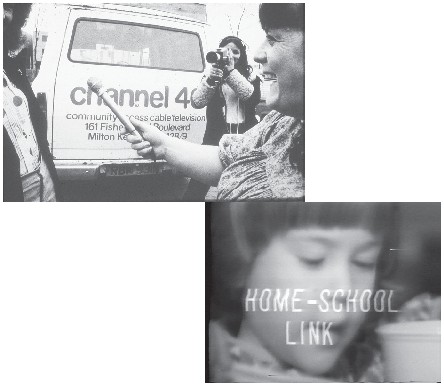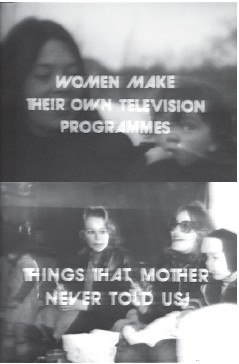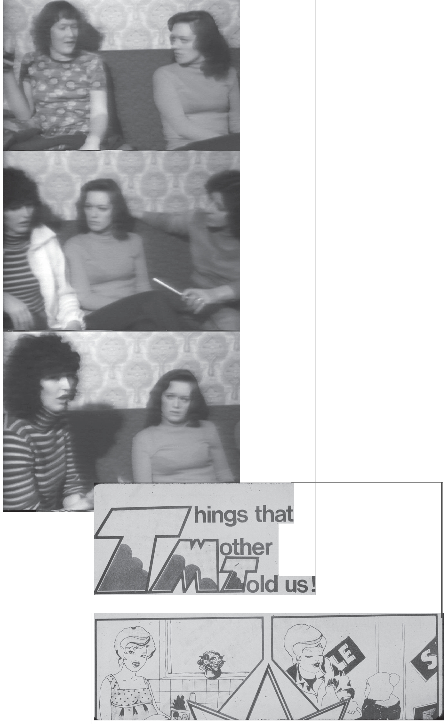
Mark Aerial Waller interviews Carry Gorney
published in Community Without Propinquity
Inheritance projects and MK Gallery 2011
I learnt about Carry Gorney's practice while reading a report on Milton Keynes' experimental cable TV project, Channel 40, which ran from 1977 until 1979. She developed two community video programmes, Sweet Sixteen and Things That Mother Never Told Us, using video as a tool to allow communities to engage in discussion and the creation of fictional frameworks through interviews. It was exciting to see that video and its transmission as a medium was not being used as a product, but as a machine to communicate across generations, or to have a second attempt at being in the present. She uses video as a time machine, strangely simple to set up, but a somehow largely ignored use. Even though it is a 'democratised' medium, video's fundamental quality to record and instantly play back, to share, watch and react, is often overshadowed by questions of picture definition and special effects. Carry Gorney talks here about the emergence of her ideas in community video projects in the 1960s, her work with women in Milton Keynes and her current work within Child and Adolescent Mental Health in the NHS.

MARK AERIAL WALLER: Could you explain about how you first came to work with video in the community?
CARRY GORNEY: In 1968 I was living in Leeds, working with Family Service Units, a social work agency working with what were then called 'problem families', 'challenging families'. I borrowed a camera from Yorkshire Television and filmed mums with their babies during a group work programme a friend and I initiated. I noticed that if you filmed people and then played it back, they really liked watching themselves on the screen. During this process, their confidence grew as they recognised that they were getting on well with their babies. That was the first video I made, I was in my early twenties. I have always been interested in video as a tool in the community.
My background was in drama, so I am someone who is interested in stories, listening to stories as well as creating them.
Later, with Inter-Action (a London based arts organisation) we worked extensively in the community using video. We created the Community Media Van - a mobile resource with mixed media facilities, to publicise local issues and events. In 1974 the van visited Milton Keynes. The Milton Keynes Development Corporation invited Inter-Action to take over the old rectory, to help build a community in the New Town. There was no city centre then. We started with Summer Programmes, using street theatre processions, on the newly built housing estates. We spent a week in one estate then moved on to another developing creative play programmes. The drama was a way of triggering interest and was followed up by meetings with parents in the community centres. Soon our main work was supporting and training parents to run their own holiday projects-don't forget, these were the early days of a growing awareness of the importance of play in children's' development. There was as yet minimal national policy. The first show we did was about a character called Prism the Professor:
Prism the Professor
became the proud possessor
Of an ancient scrap of script,
With spells and incantations,
She worked out the translations,
The key to all our dreams was right here in Milton Keynes!
Which was saying that we have the possibility of shaping the life we will lead in Milton Keynes ourselves. To stimulate children imagining their future we created a civilisation that lived here before the growing city. We invented the peoplwho used to live here, we invented the houses they lived in, the language they spoke.
MAW: Were you thinking of the generational differences? Or perhaps about time, thinking forwards and backwards, extending the present?
CG: I've always been interested in what's it like to be new in a place: how do you get a feeling of belonging? How do you get accepted and how do people choose to accept you? In 1977, I had this idea that there was no history on the housing estates, everybody was a stranger. They didn't have a kind of collective memory, because they had been transplanted. I wondered what we could do to create a sense of community and a sense of common experience. I was interested in the ages of transition, because any point of change in our lives is a point at which we become open to new experiences and different experiences.
I chose to do the programme Sweet Sixteen, because I felt that sixteen is a very good age at which to do something artistic, because people remember the music, the songs, the dancing and the clothes they wore. It is a period of rebellion, a period of transition, a period of becoming your own person, the time to decide which values from your own or your parents you want to keep, which you want to reject and how you want your life to be different. I asked groups of kids who were sixteen or younger to interview over-six teens on the estates. We ran the programme on Beanhill estate over the summer holiday and took a different street, six streets, a street for each week.
The kids would interview people, always accompanied by a volunteer or one of our Inter-Action workers to start with. They would interview people on what their memories were from when they were sixteen and then made a street newspaper. They told stories, made drawings or people gave photographs that were reproduced. At the end of the week we'd have a street party during which the newspapers were distributed and people who lived on the street would bake cakes and prepare food. There would be demonstrations of the dancing that had been talked about and some guy bought his gramophone to play old Elvis records, and everyone would be jiving on the street.
We also sat in people's living rooms and made videos.
Everyone would just sit around and talk about their memories of when they were sixteen. There were grannies there and parents of teenage kids and little kids, people across the generations, and then one person would say 'oh I remember dancing to...' whoever it was, and then another would say 'I remember we'd go to the Hackney Empire and then the sirens would go off and it was the war.'

MAW: So there were memories of different places as well, because there was no local history?
CG: A lot from London, but quite a lot from Scotland as well. They were from different places. At the end of the six weeks we gathered to put on a big cabaret to which everybody from Beanhill came. There were hundreds of people there. There was a big exhibition of photographs and demonstrations of dancing too.
MAW: I was thinking about this ongoing interest of yours of looking backwards and forwards in order to bring people together. Does that relate to how you're working at the moment, in terms of how you're working with mothers and children?
CG: What I'm doing is developing a project, Seeing is believing. I film the parent and child together; playing together, bathing, changing, eating, whatever they feel happy doing. Then I edit only keeping the bits that are good, positive images, no matter how fleeting. It's usually mums, sometimes dads. We then watch the edited tape together and then discuss it. They are very curious about seeing themselves. I ask, 'How did you know that he wanted to be picked up at that moment?' and they begin to reflect on their behavior. When someone highlights it, it is like saying, 'look you can do it!' It's great for people who don't speak English because they see it, it's there, it's evidence, and that's why it works. It's all in the editing. You need to choose the bits that hopefully will resonate. When you ask 'Where did you learn to be so good at calming your baby?,' they reply, 'Well I always loved my Granny and she was always around until she died.' So it's about bringing their own memories into consciousness.
MAW: Where do these memories come from? Do you mean unconscious memories?
CG: I am very interested how our memories invite us to think about who were then, and what other people meant to us and how our memory of them has shaped us. I'm thinking again about the work in Milton Keynes that I hadn't seen for thirty years, and God! I wasn't aware of what I was doing back then. Forming a relationship with that group of women for Women Talking, clearly I was forming that through the use of the video, through the discussion, through editing it, giving them editorial control...
MAW: And watching it together...
CG: And watching it together. I would always focus on things instinctively back then. I didn't have the psychotherapy training yet, but I was doing it then, even though I didn't know that. My Milton Keynes work was about using video to invite people to reflect on their own lives and own experiences and how they'd like things to be.
MAW: Did you think that the relationships you made with the women over the course of producing those programmes became more articulate when talking about the video process?
CG: For Women Talking (1978) I did the first lot of filming and then let the women run with it, and they would say all kinds of things about marriage and they spoke about the men in their lives. Once they watched themselves on video, their conversation would take the discussion up to another level. They would say things like: 'I wouldn't have been single then, but maybe I'd have chosen to do it at a different time.' They would become less clichéd about it, more reflective, thinking more and not just saying something sensational for the camera. Thinking about the meaning of it all, and the things in their past that led up to them making these decisions.
MAW: It's a rare thing, to be able to have a conversation and then to have a conversation about that conversation, and to have the reference there. After speaking, one often feels that the wrong thing may have been said, or that it is not quite articulated in the way one wanted. Like you say, we often slip into clichés that we can't correct, because we have not had a chance to think about ourselves, because we are put on the spot.
CG: But when they were watching it the second time, they were also thinking: 'Hey 'I'm doing alright on here.' There were comments like, 'how do I look,' but they were followed by 'I'm making a lot of sense' and 'people are listening to what I'm saying.' I think that was quite an important thing for that group of women.

Carry Gorney is a Systemic Psychotherapist and writer, based in London. She worked in community arts and video since 1968. Amongst her many initiatives, she has worked with Inter-Action in London and Milton Keynes, developing the use of video for community participation. This became the basis for a series of television programmes broadcast on Milton Keynes Channel 40 from 1977 to 1979. She is still innovating projects currently within the NHS. She uses video, through 'Seeing is Believing' a programme supporting parents and young children.
images courtesy Carry Gorney and Channel 40, Milton Keynes